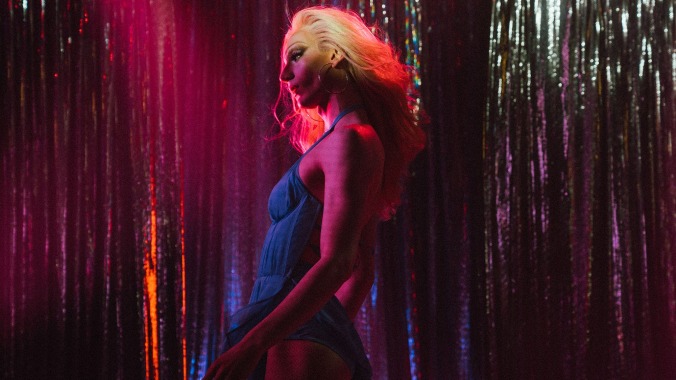Solo review: Drag queen struggles to claim her time in the spotlight
Writer-director Sophie Dupuis reunites with Théodore Pellerin to paint an intriguing romantic rivalry tale

Drag reveals as much as it conceals. A wig, some heels, a pair of lashes, and a bold lip can be as much a revelation as a refuge. In Sophie Dupuis’ glittering character portrait, Solo, a young performer using his drag artistry to build himself up must grapple with what it means to not just cede the stage but to make room within it for who he wishes to become.
When we first meet Simon AKA Glory Gore (Théodore Pellerin), an up-and-coming drag star in the Montreal scene, he is in his element. With a blonde wig and a flowy blue number to match, Glory Gore is lost in the fantasy as she lip syncs to ABBA’s “Voulez-Vous.” Pop music, it seems, allows the young, lithe boy with big expressive eyes to harness a sense of self-assured composure he dons a bit more hesitantly—performatively, even—when he’s out of drag. He’s a fiery performer, but there’s a seductive timidity about him, no doubt what first attracts the latest newcomer joining the ranks at the club. Olivier AKA La Dragona (Félix Maritaud) instantly sees in Simon a potential lover, partner, muse.
Soon the two become entangled on and off-stage. Their fiery chemistry, driven as much by mutual admiration as by a perhaps unhealthy dose of awed envy, leads Simon to lose himself in Oli’s outré aesthetic. A tad older, Oli’s approach to drag is a bit more punk, harder edged than the soft, tulle-fueled antics Simon’s mastered with the help of his sister Maude (Alice Moreault), a talented costume designer who loves bringing their joint fabulous ideas into being. In the throes of his attraction to Oli, Simon finds himself letting it all go by the wayside; his sister, his family, his sense of self. Even his own take on drag slowly disappears as the gravitational pull of his handsome boyfriend all but consumes him completely. The question of who might Simon be in the shadow of Glory Gore soon becomes more complicated once Glory further becomes subsumed into Dragona’s world.
Dupuis’ script further colors in Simon’s story with the return of his famed, estranged opera singer mother (Anne-Marie Cadieux), another strong-willed personality who has long left him feeling entranced and abandoned in equal measure. By the time Simon, in tears, notes that he’s a bit adrift—in his life, in his art, in his wants—you feel how destabilizing these thorny relationships are for the young drag star in the making. You also understand why he’s pushed to drink himself into oblivion; all the better, perhaps, to push away thoughts of feeling mistreated, ignored, emotionally abused, and gaslit.
Throughout, Solo artfully uses drag numbers (to songs like “Work it” by Marie Davidson and “Amazing” by Hi Fashion) at the local club to trace Simon/Glory Gore’s character arc. The drag couple makes for an electrifying pair on stage, feeding off on each other’s energy and making their performances all the more exciting because of their crackling chemistry off-stage. Solo is designed to highlight the artistry in this scene, letting us into the very process of creating a memorable number—and, in the process, showcasing how performers’ work can very much echo and amplify what they’re dealing with emotionally. Oli and Simon have, at first, a wonderful working relationship that feels as symbiotic and enriching as their lustful romance; they’re just as in sync while dancing on MDMA at the bar as they are gyrating and making out in full drag in front of a rapt audience.
But, as the film’s title reminds us, at the center of Solo is the question not just of what can Glory Gore achieve as a solo performer up on stage but of what Simon can become when he stands on his own (alone, if not lonely) in his life. Such twinned questions become more and more pertinent (and hard to answer) the more Olivier amplifies the young man’s insecurities with cutting remarks about his lack of taste and condescending jabs at his sense of style—all while belittling him as they fight over Oli’s open sexual indiscretions with mutual friends. To onlookers, perhaps, Olivier is a textbook case of a bad idea, a bad boy whose charm is obviously quite self-serving. Yet Dupuis—and Maritaud—sketch him well enough so that you understand why Simon would be so swayed by his wily ways.
Solo is most intriguing when its romantic rivalry takes center stage. Mid-performance, you witness Pellerin and Maritaud tracing the way both Oli and Simon calculate how their desire to be wanted by others and by one another clashes in real time, and how it forces them to figure out whether they really can share the spotlight. But Dupuis’ drama, which eventually crescendos, adding in a cascade of obstacles in front of Simon that leave him alone in the cold, cannot sustain such a high-wire act. Audiences may be left wondering whether the final dramatic twist the film stages delivers at all, or whether its closing moments feel decidedly anticlimactic, given how vibrant and kinetic its build-up had become.